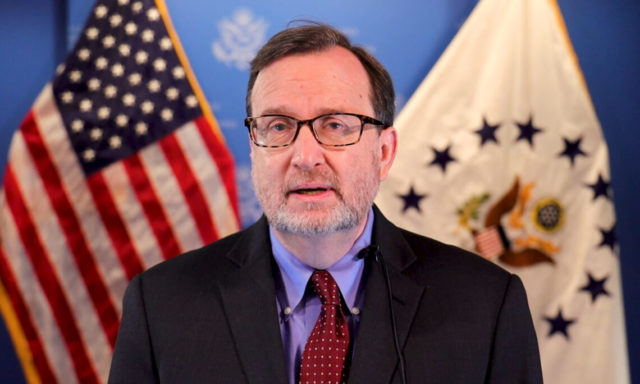U.S. Deputy Ambassador to the United Nations Richard Mills outlined the new American approach to the Israeli-Palestinian conflict at a meeting of the U.N. Security Council. While his intention was to clarify the positions of the Biden administration, his words raise as many questions as they answer.
Goal: “Mutually agreed two-state solution, one in which Israel lives in peace and security alongside a viable Palestinian state.”
Question: Yasser Arafat declined a Palestinian state on 97 percent of the West Bank territory plus half of the city of Jerusalem. What territory does the Palestinian Authority now agree will be included in the peaceful and secure State of Israel at the end of negotiations? A map would be helpful here.
Question: There are now three governments operating between the Jordan River and the Mediterranean Sea, any two of which are continually at war. Which government—Israel, Hamas, the P.A.—does the Biden administration propose to eliminate in a “two-state” scenario?
Adjunct question: How?
Mechanism: “Active consultation with both sides [because] ultimate success requires the active consent of both sides.”
Question: Can the administration point to specific prior successes altering Palestinian behavior or school teaching tools; creating a framework for transparent government; halting incitement to and payment for terror against Israelis; instituting democratic processes; or protecting free speech and civil liberties as a result of “active consultation” with the P.A.?
Question: Does the administration plan “active consultation” with the three existing operating governments to determine which one has to go?
Immediate Goal: “Member States [have] the responsibility of trying to preserve the viability of a two-state solution. [Current impasses] should [not] distract from the imperative of improving conditions on the ground, particularly the humanitarian crisis in Gaza.”
Question: The “humanitarian crisis” in Gaza is the result of spending choices made by Hamas; the same is true of spending choices in the West Bank made by the P.A. Terrorism against Israelis continues, incited by the P.A., and prevented—where it is prevented—only by the skill of the Israel Police and Defense Forces. Why is the United States committed to mitigating the consequences of Palestinian government choices that impoverish their own people and threaten the Israeli people?
Therefore: “The United States will urge Israel’s government and the Palestinian Authority to avoid unilateral steps … such as annexation of territory, settlement activity, demolitions, incitement to violence, and providing compensation for individuals imprisoned for acts of terrorism. We hope [to] build confidence on both sides.”
Question: How does the administration equate non-violent Israeli political and building decisions with Palestinian incitement to kill Jews and a Palestinian promise to pay those Palestinians who succeed in killing Jews?
Question: The prior administration invited the Palestinians to the table if they met basic requirements, including respect for human rights, financial and political transparency; the end of incitement against Israel; halting financial compensation to terrorists; and eliminating Hamas and Palestinian Islamic Jihad. Are these also the Biden administration’s requirements?
Adjunct question: How can Israel “build confidence” in negotiations with a partner that cannot meet even such low a bar for behavior?
Therefore: “The Biden administration will restore credible U.S. engagement with Palestinians … intent to restore U.S. assistance programs that support economic development and humanitarian aid for the Palestinian people and to take steps to re-open diplomatic missions that were closed by the last U.S. administration. We do not view these steps as a favor to the Palestinian leadership. U.S. assistance benefits millions of ordinary Palestinians and helps to preserve a stable environment.”
Question: Since money is fungible, any funds provided by the United States for “humanitarian” programs will allow the P.A. to divert at least that much to its nefarious programs—incitement, terrorist salaries, graft and corruption. Is the promise of U.S. assistance contingent on the P.A. providing transparent governance? If not, aren’t these steps precisely “a favor to the Palestinian leadership”?
Question: What is a “stable environment”? Palestinian people have long been unhappy with the lack of financial transparency, lack of legal recourse against the P.A. for its crimes against its own people and the lack of elementary political freedoms, including the freedom of speech. Does “creating a stable environment,” i.e., bailing out” the P.A. and Hamas, further entrench a non-democratic, authoritarian, dictatorship in Palestinian society against the interests of the people?
Therefore: “The United States will maintain its steadfast support for Israel … opposing one-sided resolutions and other actions in international bodies that unfairly single out Israel … promote Israel’s standing and participation in United Nations bodies and other international organizations.”
No Question: Thank you.
Therefore: “The Biden administration welcomes the recent normalization agreements between Israel and U.N. member states in the Arab world, as well as Muslim-majority countries … will continue to urge other countries to normalize relations with Israel, and we will look for other opportunities to expand cooperation between erstwhile adversaries. … Arab-Israeli normalization is not a substitute for Israeli-Palestinian peace. … It is the hope of the United States that normalization can proceed in a way that unlocks new possibilities to advance a two-state solution.”
Question: The Abraham Accords emerged from changed priorities in Arab and African states and their belated acceptance of the legitimacy and permanence of the State of Israel in the region. That was the demand of the United Nations on the Arab States in UNSCR 242. Not only do the accords make Israel more secure by recognizing its legitimacy and permanence, they also open the way for the P.A. (and Hamas?) to do the same. Will the United States require that the P.A. (and Hamas) join the accords and, under that umbrella, make their case for statehood?
Question: Is it possible for Israel to “normalize” relations with a P.A. or Hamas that neither commit to the principles of U.N. Resolution 242 or the Abraham Accords; that is to say, “normalize” relations with entitles determined in word and deed to erase the State of Israel from the Middle East?
Thank you, Mr. Mills, for your clear statement of the intentions of the Biden administration.


